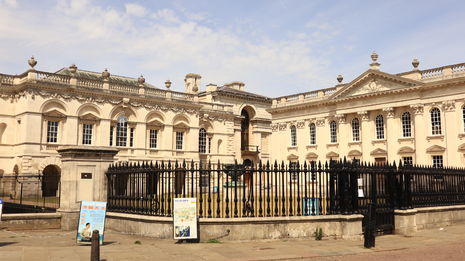The protestable state of protest
Jasper Finlay Burnside argues that our right to protest is being quietly dismantled, turning dissent from a democratic right into a regulated privilege

Over the course of this year, we have seen the University and colleges successfully seeking injunctions against student protests, limiting the space for dissent and reducing a necessity in a liberal society to a privilege permitted by a court. You do not have to agree with the protesters, their methods, or their cause to acknowledge that this is a part of a chilling trend. The University that we are part of is complicit in the gradual crippling of our ability to disagree with vested interests.
“The latest instance in a years-long erosion of the right to protest in Britain”
While initial requests were longer and then trimmed down, the fact that these institutions can request such draconian measures against basic rights is exceptionally problematic. No matter how disruptive or even disagreeable such protests may be, peaceful protests must be allowed to continue, and broadly pacific groups should never be held responsible for the actions of each of their members. Nor should the institutions that we are members of have the ability to so easily hinder groups in protesting for causes that they believe to be right.
This can also be seen around the country; mass arrests this summer were simply the latest instance in a years-long erosion of the right to protest in Britain. This critique, or longstanding truth, has nothing to do with one party but rather the modern leviathan that is the British state. Under the guise of security, and in the name of our protection, successive governments have expanded police powers and used vague definitions of terrorism, leaving our rights wilting under the contemptuous rays of an overbearing executive. Yet, rather than standing up for our rights, opposition parties have stood by, equally scornful, thereby hastening their destruction.
This is not simply the degradation of organised protest, it is the degradation of one’s individual right to express an opinion contrary to the government’s. By the nature of proscription, to show something interpreted as support for a banned group could land you in prison for more than a decade. Those we see most commonly arrested are not hardened criminals or dangers to society; they are pensioners. But given that there is no space within the prison system, imprisonment seems like more of a threat than a promise for the gangster geriatrics. The bilious feeling many of us now have has nothing to do with a specific cause and everything to do with this attack on our ability to challenge the status quo, and to scrutinise institutions which should always be held to a high standard.
“You are the victim of this overreach. An attack on anyone’s rights is an attack on us all”
The state’s lust to diminish rights did not appear overnight. Since 9/11, the security state, like a cancer, has silently destroyed the organs of our democracy. In the name of supposed security, states became overbearing parents, or more accurately, prison guards, monitoring not only the physical world, but the digital one. We were told this was for our own good, that we need only fear if we had something to hide. Like Bentham’s panopticon, we are all surveilled constantly, yet we do nothing. When Snowden’s files were released in 2013, we were briefly surprised, and then we did nothing. When the government announced it had ended a super-injunction preventing reporting on a data leak, we did nothing. When mass surveillance programs are renewed, we take no notice.
You might think that this has nothing to do with us, that this is nothing new, or even that it is necessary. But the abominable and abysmal state we find ourselves in is a threat to all of us. It doesn’t matter what you think about a myriad of other issues. It matters because you are the victim of this overreach. An attack on anyone’s rights is an attack on us all. It plants the seed that rights are not inalienable, but rather reducible. The nature of our constitution requires us to take action to defend our rights, because as we are now discovering, precedent is far too easily undermined.
I am not so foolish as to argue for a slippery slope; rather, this is an observation of the ground we have lost, and now have to make up. The idea that a curtailing of our rights in the absence of war or crisis has ever been in our interest is an argument that evaporates upon contact with reality. If you believe and want to live in a society that can ask difficult questions and is tolerant of dissent, then you must take notice. You must be ready to stand for the rights of those with whom you disagree. Not because they are right, or because their ideas are particularly agreeable, but because once the state has silenced them, it might just come for you.
 News / Colleges charge different rents for the same Castle Street accommodation2 March 2026
News / Colleges charge different rents for the same Castle Street accommodation2 March 2026 News / News in Brief: waterworks, wine woes, and workplace wins 1 March 2026
News / News in Brief: waterworks, wine woes, and workplace wins 1 March 2026 News / Climate activists protest for ‘ethical careers policy’1 March 2026
News / Climate activists protest for ‘ethical careers policy’1 March 2026 News / Angela Merkel among Cambridge honorary degree nominees27 February 2026
News / Angela Merkel among Cambridge honorary degree nominees27 February 2026 News / Private school teacher who lied about Cambridge degree barred from teaching27 February 2026
News / Private school teacher who lied about Cambridge degree barred from teaching27 February 2026









